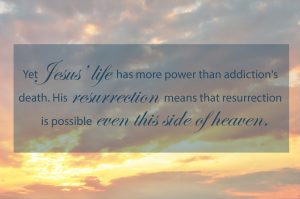Redemption: The Unexpected Consequence of Suffering
“Suffering has been stronger than all other teaching, and has taught me
to understand what your heart used to be. I have been bent and broken,
but – I hope – into a better shape.”
~ Charles Dickens, Great Expectations
Suffering has an unexpected consequence. It produces redemption. It teaches you to understand, as Dickens wrote, what “your heart used to be.” That is what redemption is – becoming more of what “your heart used to be.”
Combine those sentences and you get: Suffering produces redemption.

This is a completely counter-intuitive – right up there with: “Lose your life in order to gain it.” But Jesus is always saying such things. He leads us forward by entering life backwards. Losing your life is the way to gain it. Suffering produces redemption. Like I said, counter-intuitive.
.
So how does suffering produce redemption? In short, suffering makes you need again. Needing is what “your heart used to be.” All our lives, we carefully construct an illusion of self-sufficiency.
Suffering, whether all-at-once or piece-by-piece, deconstructs that illusion. Self-sufficiency is the illusion that “we have made hearts to be.” But it is not what “our hearts used to be.” “Self-sufficiency” turns our life into an illusion; suffering makes us real again.
Here is a universal example of suffering: aging. Everyone experiences it. It isn’t the acute suffering, like an automobile accident or a betrayal or a serious diagnosis. It is literally spread over a lifetime, happening day-by-day. But it is serious – terminal in fact. Aging is a suffering that slowly but surely exposes the lie of self-sufficiency. Slowly but surely, aging returns you to what you used to be – a dependent creature.
Now the normal reaction to dependence is aversion and disgust. “Sure,” you might say, “I see that aging eventually makes me into a dependent creature. But that is completely opposite to what I want.” Our normal reaction to suffering is repulsion. But our aversion to the work of suffering isn’t just because it is often physically painful. We reject suffering because it uncovers the core of who we are; it uncovers our need. When our need is uncovered, we feel intense shame.
But it wasn’t always so. Our hearts used to be comfortable with need. Our original blessed state was “naked and unashamed.” We saw our dependence as a good thing. In fact it was the best thing about us. We were made for God’s grace – vast amounts of it. And there were vast amounts of it. Naked and unashamed; we basked in it, asked for it, rejoiced in it. It was OK to need God because that was our privileged position in creation. It still is.
Suffering teaches us “what our hearts used to be.” Our hearts used to be like unashamed flowers – needing the sun, opening up every morning to receive as much as their face could hold. When suffering teaches us that we need, it slowly removes the shame of needing. We slowly accept it as the truth and then we can lift our face to receive. We have experienced redemption. We become once again who we are made to be.
 Roger Edwards joined The Barnabas Center in 1991. In addition to counseling individuals and couples, Roger teaches and leads discussion groups about applying the Bible to everyday life. He is a licensed professional counselor, holds a master’s degree in biblical counseling from Grace Theological Seminary in Indiana and earned a bachelor’s degree in engineering from the University of North Carolina at Charlotte. He is married to Jean, and they have seven children.
Roger Edwards joined The Barnabas Center in 1991. In addition to counseling individuals and couples, Roger teaches and leads discussion groups about applying the Bible to everyday life. He is a licensed professional counselor, holds a master’s degree in biblical counseling from Grace Theological Seminary in Indiana and earned a bachelor’s degree in engineering from the University of North Carolina at Charlotte. He is married to Jean, and they have seven children.






1 comment
Thanks Rog, I needed that. I really miss you and the BC crew.